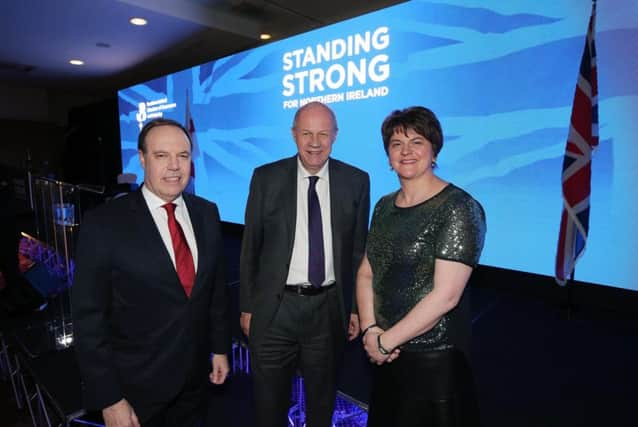Ben Lowry: Underneath the bonhomie at the DUP conference, there was an awareness of the big political challenges


On the one hand, the DUP gathering at the La Mon house hotel had all the bonhomie and confidence and happiness that you would expect from a party at the top of its game.
Almost all of the leading party members seemed to be there, and they were basking in their recent electoral dominance, as well as their new found influence with the Conservative Party.
Advertisement
Hide AdAdvertisement
Hide AdAt points during the short address by Julian Smith MP, the Tory chief whip, the DUP membership in the audience roared with the sort of approval that could have fooled anyone who didn’t know better into thinking that the two parties had actually formed a voluntary electoral coalition, like the former UCUNF Tory-UUP pact, rather than a political pact to keep the UK government in place after a pragmatic and tough negotiation between two parties.
And the overall jubilant air at the conference was misleading in another way: the DUP gathering was in fact happening at a time of huge political uncertainty for that party, for the Conservatives, for Northern Ireland and for the UK as a whole.
The Irish border issue has now taken on such significance that Dublin believes it can within weeks stop the EU Brexit negotiations from moving to the next stage, unless it gets assurances that will be wholly unacceptable to unionists.
Meanwhile, the Stormont negotiations are a key phase, with direct rule unable to be fended off for much longer, and a possible Dail election set to bring the talks to a halt.
Advertisement
Hide AdAdvertisement
Hide AdAt the same time, the very situation that gives the DUP its current influence, its ability to prop up Theresa May, could vanish at any moment if various scandals and challenges bring her weakened government crashing down.
This is not to say that anyone at the DUP conference was walking round with a long face – far from it, there was much back-slapping and laughter among delegates.
But when I spoke to various leading members, including five of the 10 MPs, several MLAs, advisors and councillors, no-one even tried to deny the challenges in both London and Belfast.
I asked each of them the same questions: would Mrs May’s government soon implode? Might Dublin prevail in its border pressure? Was a Stormont deal imminent?
On the first two matters, there was near unanimity:
Advertisement
Hide AdAdvertisement
Hide AdFirst, that while the prime minister’s administration was extremely weak, there was an absolute determination among Tories to avoid a general election, and this would probably succeed in preventing one.
Second, that the Irish government was not managing to change London’s mind on the Province leaving the single market and customs union, alongside the rest of the UK.
As to the prospects of power-sharing, there was unanimity that a standalone Irish language act was now undeliverable, even if it might once have been. There was also a clear view that Sinn Fein must not be seen to get reward for its tactics. But there seemed to be genuine uncertainty on the likelihood of a Stormont deal.
Unless perhaps those in the know were, to a journalist, feigning ignorance of the sate of play in the talks.